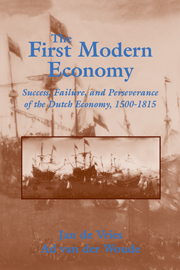5 - Three questions
Published online by Cambridge University Press: 26 October 2011
Summary
What was the influence of the medieval legacy?
Both the suddenness and the intensity of the Republic's economic prosperity provoke amazement and compel us to search for factors that might help to account for such an achievement. In this first section, we address the historical background factors that distinguished the Northern Netherlands from its neighbors, and we then turn in the second section to an examination of the claims made for the most striking and profound alterations in sixteenth-century social life. In this chapter's third section, we confront the basic issue of the coherence of the phenomenon to which this study is dedicated: In what sense was there a unified Dutch economy?
In the preceding chapters, we explored three mutually related background factors: the geographic situation and all that attaches to it, the high level of urbanization, and the economy's high level of monetization. One might properly ask whether these conditions – so different from those of most of Europe, and in place well before 1500 – contributed to the development of mentalities and social structures that were especially suited to the rapid emergence and intense prosperity of a modern economy. Such a question requires that we enter a terrain where quantification is useless, convincing demonstrations are difficult, and tentative and suggestive treatments are as much as one can hope for. Yet this should be no reason peremptorily to dismiss an issue that invites us to an appreciation of mentalities and an evaluation of the influence of institutions and structural conditions as brakes on, or catalysts of, social processes.
- Type
- Chapter
- Information
- The First Modern EconomySuccess, Failure, and Perseverance of the Dutch Economy, 1500–1815, pp. 159 - 192Publisher: Cambridge University PressPrint publication year: 1997
- 1
- Cited by



